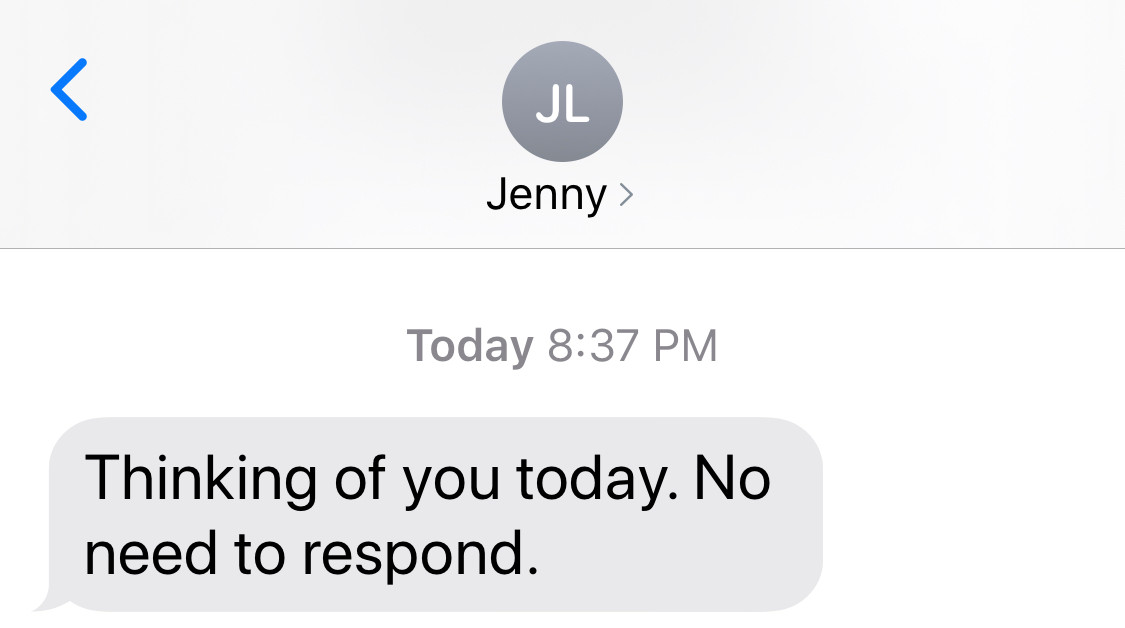“I’m going to the grocery store in the morning. Text me your list.”
In the midst of a flurry of medical activity, I received this text from my friend Erin. She knew that my 43-year-old husband had recently been diagnosed with terminal brain cancer. To say that life was all of a sudden spiraling out of control was an understatement. Getting to the grocery store was nowhere on my priority list.
“Need milk desperately,” I replied. I think I added a few other staples for good measure.
“Perfect,” came the message back. “Will you be home around 11?”
At a time when my life was turned upside down, I came to appreciate texting as a communication device. I’d done my share of texting prior to this, of course, but I learned to truly appreciate its advantages when my family was in crisis.
It seems I’m not alone in embracing texting. According to Gallup, texting is now the most common form of communication for Americans under age 50. With texting now ubiquitous, how can we use it effectively to support our friends in times of serious illness, grief, and loss? Below are some suggestions based on my experience as a caregiver for my young, terminally ill husband. I was fortunate to have tremendous support from my community, and much of it was coordinated and communicated by text.
“I’m at Costco. Do you need anything?”
Like the text requesting my grocery list, this one was a lifesaver. It’s immediate, it’s practical, and it lets the person know you’re thinking about them. It’s so much easier to consider this specific question – and to reply, yes, I need cat food and toilet paper – than it is to consider a more open-ended offer of help. And let’s face it – getting to Costco can be overwhelming for someone who is consumed with caregiving. If a friend is there right now and offering to pick up necessities, this is so very helpful.
“I walk my dog every morning around 9. Can I walk yours then, too?”
Yes! Please! Because between hospital visits, phone calls, paperwork, and caregiving, the dog wasn’t getting walked. I was grateful to anyone who could help remedy that. The dog was, too.
“I’ve got wine and cheese, and would be happy to swing by later if you’d like company.”
This is a great way to offer your presence to your friend. They know you care, and would like to spend time with them. They don’t have to worry that they don’t have anything to serve. If tonight isn’t good, they can suggest tomorrow. It’s so much more manageable than, “Let me know if you ever want company.” They will likely not want to interrupt you at any specific time when the offer is so general. If you make a concrete suggestion, it’s much easier for them to say yes or no, or to suggest another day. And if you’ve reached out by text, they can reply when they have both the time and energy to do so.
“Thinking of you today. No need to respond.”
This is almost always appropriate and appreciated. It lets the person know you’re thinking about them, and it does so in a way that doesn’t obligate them to talk about the latest updates, or how they are feeling, or anything else in particular. It lets them know you care, and they can always respond if they do want to talk. If they don’t, there’s no pressure to respond with more than “thanks,” or even to respond at all.
People generally want to be helpful when their friend takes on the role of caregiver for a loved one. Sometimes they hesitate to reach out because they are not sure how to help, and they often don’t want to intrude by calling at a bad time. Texting can be a great communication tool to help us reach out in ways that are thoughtful, non-intrusive, and truly helpful.

Find more tips for supporting grieving friends in my free guide “How to be helpful: Tips for allies of widowed families.”
Follow us here and subscribe here for all the latest news on how you can keep Thriving.
Stay up to date or catch-up on all our podcasts with Arianna Huffington here.


